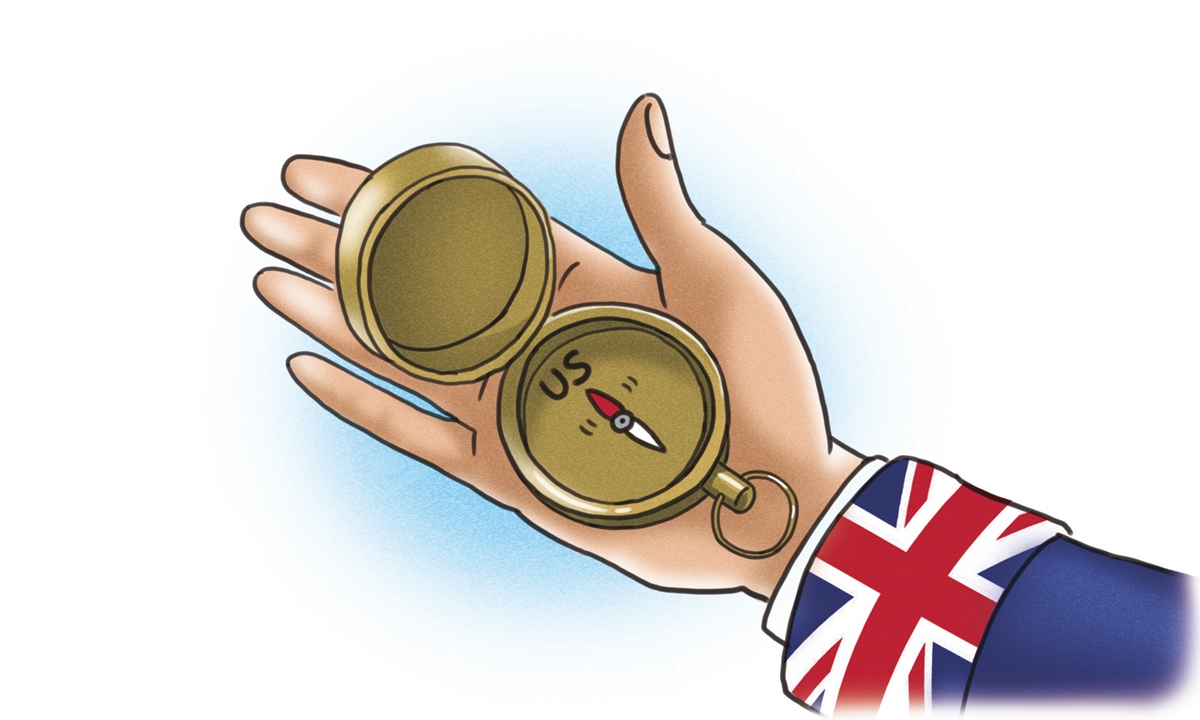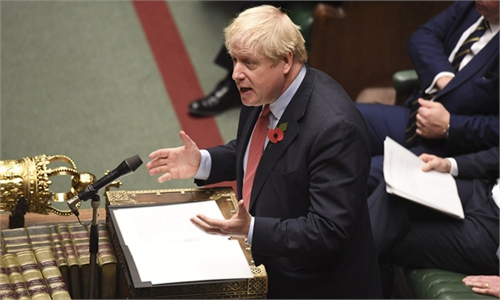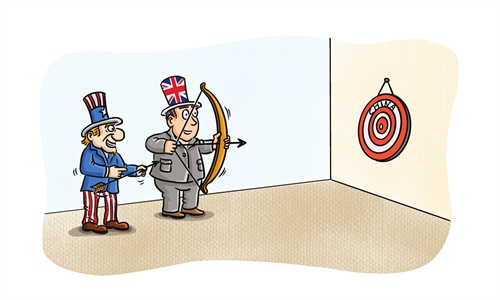
Illustration: Liu Rui/GT
From Golden Age partner to a vanguard that attacks China on various fronts, the US factor is the biggest influence behind the freezing China-UK ties, said Chinese observers. They pointed out that London is striving to stand up in the contest between Beijing and Washington, but such opportunistic diplomatic tricks will backfire.
The most recent attack from the UK came when London, at a regular session of the UN Human Rights Council on Monday, called for the UN to be given "urgent and unfettered" access to Northwest China's Xinjiang Uygur Autonomous Region to investigate so-called abuses in this region.
Britain's foreign secretary Dominic Raab on Monday denounced torture, forced labour and sterilizations that he said were taking place against Muslim Uygurs on an "industrial scale" in Xinjiang, media reported.
Raab, in a recorded speech to the UN Human Rights Council, said that the rights of people in Hong Kong - a former British colony - were being "systematically violated". The national security law imposed by China was inhibiting freedoms, he said, calling for free and fair legislative elections to take place.
The bilateral ties have spiraled downward since the UK decided to issue special five-year visas and a pathway to full British citizenship to BNO passport holders and their dependents, a move repeatedly slammed by China as "interfering in domestic affairs." China has said that it will not recognize the BNO as a valid travel and ID document.
Just a few years ago, relations between the UK and China were said to be in a golden age. Chinese observers attributed the UK's gradually more hostile attitude toward China to the US.
"The US is the biggest influence," said Sun Keqin, a research fellow at the China Institutes of Contemporary International Relations.
Sun said that after Brexit, the UK is eyeing diversified diplomatic tactics to fit its interests. US President Joe Biden, who seems to differ from his predecessor's "choose one or the other" policy, offers more goodwill and promise to its old allies. So the UK believes that standing closer to Washington is the optimal choice for it right now.
To prove its value to the US, the UK feels the need to act as the most vocal one to confront China, said Cui Hongjian, director of the Department of European Studies, China Institute of International Studies, noting that London also still views itself as an "empire on which the sun never sets" who sees involving in contest between world's two superpowers, China and the US, as something that suit its international status.
Martin Jacques, a former senior fellow at the Department of Politics and International Studies at Cambridge University, also attributed the change to anti-China forces in the UK. "The Anti-China movement seems to be steadily gaining momentum in the UK," he said.
He has compared the movement to a crusade, and media, including the BBC, have played an important part in this movement. "The crusade has mobilized around two issues in particular: Xinjiang and Hong Kong," he told the Global Times previously.
Yet observers noted that being hawkish on China is not the real intention of the UK, which advocates pragmatic diplomacy. "London is hardening its stance now, but at the same time, London is sending certain goodwill signals," said Sun.
UK Prime Minister Boris Johnson said recently that he was "fervently Sinophile" and was determined to improve ties "whatever the occasional political difficulties." Johnson also sent warm greetings to Chinese people during the Chinese New Year.
"I wish you and all those celebrating across the globe a happy and prosperous Lunar New Year," Johnson said in a video message last Friday, before offering a greeting in Cantonese.
"It's a carrot-and-stick trick," said Sun, noting that while it's buttering up the US, the UK is also planning a retreat for better China-UK ties in the future, and keeping bilateral relations from hitting the bottom line.
Cui pointed out that the risk of such "opportunistic diplomatic tricks" is that China won't take the bait, and if the UK continues down the wrong road, the UK may end up putting all its eggs in one basket. "So from an overall perspective, it is a rash advance," said Cui.
Observers are optimistic that bilateral ties won't recede fully or even melt down, citing economic cooperation as a stabilizer.
"China's attraction to the UK on economic collaboration will long exist … but the UK has to strike a balance between relations with both China and the US. As it now gets more involved in the China-US contest, the UK's ability to control risks is going down, and the UK needs to be cautious about it," said Cui.




